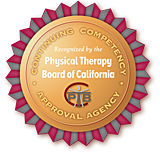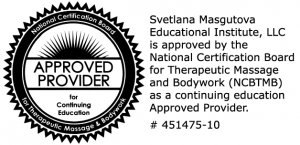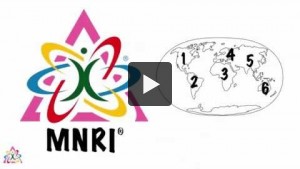


Event Registration


endorsement of specific course content, products, or
clinical procedures by AOTA or indicate AOTA approval
of a certification or other professional recognition.
This course is offered for 1.6 AOTA CEUs /
16 Contact Hours (Introductory level;
Occupational Therapy Process: Evaluation, Intervention)


Educational Institute LLC
1.6 ASHA CEUs
does not imply endorsement of course content, specific
products or clinical procedures.
MNRI® NeuroTactile Integration • Online
Class Schedule: Friday-Saturday, November 15-16, 2024. 10:00 AM to 7:00 PM Eastern Time (Breaks Included)
A digital copy of the manual is included with your registration. Hard copies are available for purchase following registration.
Dates: November 15-16, 2024
Dates: Course begins at 10:00 am Eastern TIme
Location: Online Course
Instructor: Suzanne Amanor-Wilks
CEUs: This course is offered for 1.6 ASHA CEUs
(Introductory level, Professional area)
This course is offered for 1.6 AOTA CEUs / 16 Contact Hours
(Introductory; Occupational Therapy Process: Evaluation, Intervention)
CE Hours: This course is offered for 16 NCBTMB CE Hours
The Masgutova Method® is a set of programs focused on the restoration and maturation of primary movements, reflexes, coordination systems, skills for optimal performance of natural mechanisms, developmental processes, brain functioning, and sensory-motor integration. You can read more about Reflexes and MNRI HERE.
Watch an overview of how MNRI works
The Mission of the Svetlana Masgutova Educational Institute (SMEI) is to provide health, wellness and educational professionals, parents, and caregivers with non-invasive techniques to address maturational, developmental, and life challenges.
Course Overview
Skin, our largest organ, forms the boundary between our physical being and the outside world. It also houses the NeuroTactile system, which allows the body to access NeuroTactile sensations from the outside world. The skin possesses eleven different NeuroTactile receptors to distinguish the broad array of NeuroTactile stimuli input encountered by the body. This set of NeuroTactile receptors helps to inform and prioritize incoming sensory information for the central nervous system to process. Once processed, the central nervous system directs the body’s actions in response to ever-changing NeuroTactile conditions. Due to congenital issues or trauma (in utero, at birth, or anytime after birth), NeuroTactile system challenges can result, causing any one of the following conditions.
- Hyper-sensitive NeuroTactile System – Also referred to as NeuroTactile defensiveness, this results in a negative, over-reaction to touch that typically would not be a problem. A person with a hyper-sensitive NeuroTactile system will often respond negatively to hugs, having their hair brushed or nails clipped, and complain about various textures, seams, tags and avoid wearing any form fitting clothes. A simple skin scrape can elicit a reaction expected for a far more debilitating wound.
- Hypo-sensitive NeuroTactile System – A person with a hypo-sensitive NeuroTactile system often does not respond to NeuroTactile input that would cause most people to act. A deep cut, a hard push, or other forms of physical harm lead to little or no reaction. NeuroTactile input important to taking action and avoiding harm, is often missed by a person with a hypo-sensitive NeuroTactile system, leaving them at risk for great harm. People with hypo-sensitive NeuroTactile systems often seeking more intense sensory stimulation in an effort to register sensation.
- Non-Functioning NeuroTactile System – A non-functioning NeuroTactile system is simply not working.
The reactions of a person with either a hyper- or hypo-sensitive NeuroTactile systems, often seem bigger or smaller than normal conditions would dictate. Such disproportionate reactions are often an indication that an individual’s NeuroTactile system is not appropriately engaged and integrated. The MNRI NeuroTactile Integration program uses neuro-tactile techniques to stimulate different receptors in the skin, working to appropriately engage and integrate the NeuroTactile sensory system within the complete mind/body system. When the NeuroTactile system is integrated, the brain stem relaxes defensive reflexes, and opens the entire system to an experience of safety in which emotion and behavioral regulation improves and healthy motor, communication, and cognitive development can proceed.
Professionals, parents and caregivers interested in learning more about the MNRI Method and its various programs are encourage to attend this course early on, given the fundamental role it plays in emotional and behavioral regulation, and overall maturation and development. The NeuroTactile Integration course explores in great detail the physiology and psychology of the NeuroTactile system, the developmental effects of over- and under-sensitive receptors, and the importance of an appropriately integrated NeuroTactile system to the process of integrating all motor reflex movement and patterns.
The MNRI NeuroTactile Integration course explores:
- The general MNRI Method and role played by the NeuroTactile Integration Program
- NeuroTactile integration and how it relates to motor reflexes and other important body systems
- The neurophysiologic and psychological dynamics of the NeuroTactile system
- The role NeuroTactile integration plays in establishing a foundation for motor, communication and cognitive development, and emotional and behavioral regulation
- MNRI techniques designed to assess, activate, and integrate NeuroTactile sensitivities
- How to create MNRI NeuroTactile integration programs for individual clients
- How to incorporate use of MNRI NeuroTactile Integration course content into daily client and home practice
Learner Objectives:
Upon successful completion of the two-day, 16-hour NeuroTactile Integration course, participants will:
- Describe NeuroTactile Integration processes and how it effects sensory-motor reflex patterns and other important body systems and how it alleviates negative physical and psychological effects of sensory stimuli in stress.
- Explain the neurophysiological and psychological dynamics of the tactile system development.
- Describe the process by which the brain engages in protection versus learning and development.
- Describe how the strategies taught in this course optimizes the brainstem, relaxes defensive reflexes and opens the entire system for healthy development.
- Demonstrate the process of skin and tactility development from utero time and the origins of the nervous, cardiovascular, and immune systems.
- Describe the three layers of skin and how each affects the sensory processing and the development of the nervous system.
- Explain the MNRI® NeuroTactile Integration program, the neuro-tactile procedures, and techniques used to regulate functions of different receptors and dermatomes in the skin.
- Describe how the role of the skin receptors effect the neurophysiological bases for the development of the reflex arcs and circuits.
- Demonstrate how skin is the main organ for the sense of touch and what that means for the healthy development of cognitive, social, emotional and physical areas in an infant.
- Describe the connection between the deep sensibility system and proprioception and its connection with the muscular system and motor control.
- Explain the neurophysiological functioning of the tactile system and its connection to the brain, spinal cord and nerve network.
- Apply through hands-on supervision the exercises to implement MNRI® neuro-regulation techniques designed to activate and integrate challenged tactile systems: Front and Sides of Body Greeting, Arm and Leg Segments, Rotations, Core, Head, and Back of Body.
- Describe how to create and apply an individual MNRI® program for clients with various neurodevelopmental deficits and learning challenges.
Agenda:
Hour 1 : Movement as basis of Natural Development
Hours 2-3 : Masgutova Method® of Neruosensorimotor Reflex Integration and Archetype Movements
Hour 4 : Reflexes serve as the Neuro-Physiological Basis for Development of Infant Movements
Hours 5-6 : importance of skin development, structure, and functions
Hours 7-8 : importance of skin functioning and sensory motor integration
Hours 9-10 : Importance of exteroceptive and proprioceptive systems and the development of the RAS system
Hour 11 : NeuroTactile Integration procedures
Hour 12 : Characteristics of Human Auditory and Vestibular Systems and connections with the brainstem, nerve network and skin systems.
Hours 13-15 : role of receptors in neurophysiological bases of NeuroTactile sense development
Hour 16 : Benefits of NeuroTactile integration for optimal integration of reflexes, enhancement of the sensory integration system
Financial Disclosure: Suzanne Amanor-Wilks receives a stipend based upon an enrollment percentage.
Non-financial Disclosure: No relevant relationship exists.
Course Disclosure: The Svetlana Masgutova Educational Institute has developed and patented a licensed technology trademarked as MNRI®. Because there are no other like-kind products available, course offerings will only cover information that pertains to the effective and safe use of the above-named products. This presentation will focus exclusively on MNRI® and will not include information on other similar or related products or services.
Special Needs Requests: If you require special accommodations, please notify SMEI at events@masgutovamethod.com at the time of registration so that needed accommodations can be made prior to the course.
Course Completion Requirements: Full attendance is required to receive a certificate of completion and any available credit hours or CEUs.
Target audience:
Speech Language Pathologists, Speech Language Pathologist Assistants, Occupational Therapists, Certified Occupational Therapy Assistants, Nurses, Physical Therapists, Physical Therapist Assistants, Educators, Psychologists, Physicians, Massage Therapists, Mental Health Counselors, Other Health Care Providers, Parents.
Assessments:
In Person Courses: Self Assessment and technique demonstration.
On line Courses: Self Assessment and technique demonstration.
SMEI Cancellation and Refund Policy
Online courses are subject to cancellation due to lack of minimum required participants registered for the course within 2 days of the course start date. Full refunds will be issued if the course is canceled due to the low number of attendees.
- Participants will receive a full refund for registration cancellation up to 5 days prior to the event.
- A 10% administration charge will be retained for cancellations within 3-4 days prior to the course.
- A 25% administration charge will be retained for cancellations within 2 days prior to the course.
Transferring Policy
Participants who wish to transfer registration and payment to another
SMEI course may do so up to 5 days prior with no penalty. If within the
5 days, a 10% administration fee will be charged.
*Participant must have selected the course they wish to transfer to at the time of the request. All refunds will be held until the transfer course has been selected.
* A 2.5% transaction fee (processing fee) will be withheld on all refunds that were processed using credit card/PayPal. If a participant wishes the refund to be paid directly to their account via credit card/PayPal, PayPal may also charge the participant an additional 2.5% transaction fee (processing fee). Refund by check is available upon request. For questions contact us.

